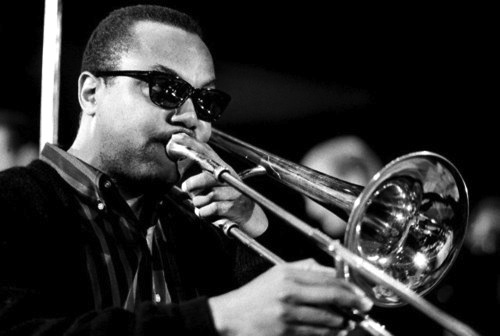Is Trombone Hard to Learn?
Are you thinking about learning an instrument? Or maybe just learning a new instrument. Are you thinking about learning trombone? I think you will find this article really helpful. This first question you probably have is, is trombone hard to learn?
Yes, trombone is a hard instrument to learn. It takes time to get a nice sound out of the instrument and since their are not any values or keys, you have to use your ear to play in tune. It is an incredibly fun instrument to play though!

Why you should play trombone
Learning to play the trombone can be a rewarding experience for many reasons.
Firstly, playing the trombone can improve one's overall musicianship. The trombone is a unique instrument in that it is a brass instrument that uses a slide instead of valves to change the pitch. This means that players must develop a strong sense of pitch and intonation, as well as good breath control and embouchure. These skills are transferable to other instruments and can help improve overall musicianship.

Secondly, playing the trombone can be a great way to express oneself. The trombone has a wide range of dynamics and tone colors, making it a versatile instrument for different genres of music such as jazz, classical, and pop. The trombone can also be a great solo instrument, allowing players to showcase their individual talents and creativity.
Thirdly, playing the trombone can be a great way to socialize and make friends. Joining a band or orchestra is a great way to meet other musicians and make friends with people who share a common interest. Playing in a group also allows players to improve their ensemble skills and learn how to work well with others. If you are ever interested in learning trombone or music in general, check out our music lessons in Plymouth and Canton.
Lastly, learning to play the trombone can be a great way to stay mentally and physically active. Playing an instrument requires focus and concentration, which can help keep the brain sharp. Additionally, playing the trombone requires good posture and breath control, which can help improve overall physical health.
Top 3 Jazz Trombonists
- J.J. Johnson

J.J. Johnson, also known as James Louis Johnson, was a highly influential jazz trombonist who made a significant impact on the instrument during his career. He is considered to be one of the greatest jazz trombonists of all time and was known for his virtuosity and technical prowess.
Johnson began his career in the 1940s and quickly made a name for himself as a sideman, playing with jazz greats like Dizzy Gillespie, Charlie Parker, and Miles Davis. He later led his own groups and recorded many albums as a bandleader. J.J's style was characterized by his intricate, complex solos and his use of advanced harmonies and dissonance. He was one of the first jazz trombonists to incorporate bebop techniques and style into his playing, making him a pioneer of the bebop movement.
Johnson's virtuosity on the trombone was widely recognized by both critics and musicians. He was known for his technical proficiency, particularly his ability to play fast, complex lines with ease and precision. He also had an impressive range on the instrument and was able to play in a wide variety of styles. He was also known for his ability to play with great expressiveness and lyricism, making him a favorite among jazz aficionados.
Throughout his career, Johnson recorded and released many albums, both as a bandleader and as a sideman. Some of his most notable works include "Jay and Kai", "Jay and Kai + 6", and "The Eminent Jay Jay Johnson". He also collaborated with other jazz greats like Miles Davis, Thelonious Monk, and Sonny Rollins. He was awarded several Grammy nominations, and a Grammy award in 1996 for "Best Jazz Instrumental Solo" for his performance on the album "Trombone Evolution".
Check out this classic J.J. Johnson recording
- Slide Hampton

Slide Hampton is a jazz trombonist, arranger, and composer. He began his career in the 1950s as a member of the Lionel Hampton Orchestra and went on to play with a number of notable jazz musicians, including Dizzy Gillespie, Miles Davis, and Thelonious Monk. In the 1960s, he formed his own group, the Jazz Masters, and released several albums as a leader.
Hampton's trombone playing is characterized by a smooth, fluid sound and a strong sense of swing. He is known for his virtuosic technique, which allows him to play rapid-fire runs and complex harmonies with ease. He is also an accomplished arranger, and many of his compositions and arrangements are considered jazz standards.
In addition to his work as a performer and arranger, Hampton has also been a mentor to many young jazz musicians. He has taught at several universities and music schools, and has been involved in a number of jazz education programs.
Throughout his career, Hampton has received numerous accolades and awards for his contributions to jazz. He has been inducted into the International Jazz Hall of Fame and has received a lifetime achievement award from the National Endowment for the Arts.
Despite his many accomplishments, Hampton continues to be active in the jazz scene. He continues to perform, record, and arrange music, and his contributions to the jazz world will continue to be felt for many years to come.
Check out this crazy trombone solo!
- Curtis Fuller

Curtis Fuller is an American jazz trombonist, composer, and bandleader known for his work in the hard bop and post-bop genres. He began his career in the 1950s as a member of Art Blakey's Jazz Messengers, and went on to play with a number of notable jazz musicians, including John Coltrane, Benny Golson, and Miles Davis. He has also released a number of albums as a leader throughout his career.
Fuller's trombone playing is characterized by a powerful, full-bodied sound and a strong sense of swing. He is known for his virtuosic technique and his ability to play fast runs and complex harmonies with ease. He is also an accomplished composer, and many of his compositions and arrangements are considered jazz standards.
Throughout his career, Fuller has been a vital force in the jazz scene. He has performed and recorded with many of the most respected jazz musicians of his generation and has been a bandleader on several albums. He has also been a mentor to many young jazz musicians, and has been involved in a number of jazz education programs.
Fuller has been honored with a number of accolades and awards throughout his career. He was inducted into the International Association of Jazz Educators Hall of Fame in 2003, and in 2011 he was a recipient of the NEA Jazz Masters award. He's also been a nominee for the prestigious grammy awards for his album "Down Home" in 1996.
Despite his many accomplishments, Curtis Fuller continues to be active in the jazz scene. He continues to perform, record, and compose music, and his contributions to the jazz world will continue to be felt for many years to come.
Check out this cool transcription of Curtis's Blue Train solo:
Well I hope you have learned a thing or two about trombone and why you should learn to play it. Yes, trombone is a hard instrument to learn, but if you practice every day and study these masters you will get it! Thank you for reading to the end of the article and keep practicing!



